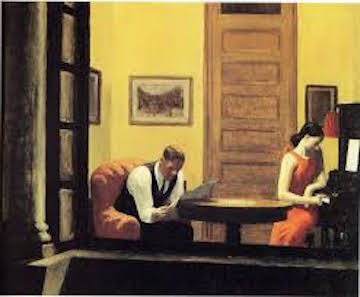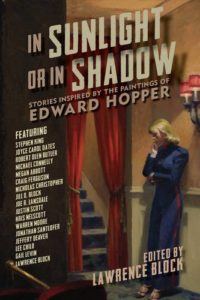When I drew up my wish list of contributors for In Sunlight or in Shadow, I took a breath before writing Stephen King’s name on it. The man is a phenomenon, even as his work is phenomenal, but the chance he’d be moved to write a story for a new anthology seemed slim indeed. But I somehow sensed (and perhaps the wish was father to the thought) that he had some special feeling for Edward Hopper’s work, and that his response to the artist might prompt a story.
“I’m saying no to almost everything,” he replied, “but I’m going to table this for a bit instead of saying ‘No’ outright, because I love Hopper.” We agreed that I could list him as a “definite remote possibility,” and a few emails later he chose the painting he probably wouldn’t find time to write about: “There’s a painting, ‘Room in New-York.’ I have a repro of it in my house, because it speaks to me.”
A couple of months later, he gave it a voice we can all hear.

THE MUSIC ROOM
By Stephen King
The Enderbys were in their music room—so they called it, although it was really just the spare bedroom. Once they had thought it would be little James or Jill Enderby’s nursery, but after ten years of trying, it seemed increasingly unlikely that a Baby Dear would arrive out of the Nowhere and into the Here. They had made their peace with childlessness. At least they had work, which was a blessing in a year when men were still standing in breadlines. There were fallow periods, it was true, but when the job was on, they could afford to think of nothing else, and they both liked it that way.
Mr. Enderby was reading The New York Journal-American, a new daily not even halfway through its first year of publication. It was sort of a tabloid and sort of not. He usually began with the comics, but when they were on the job he turned to the city news first, scanning through the stories quickly, especially the Police Blotter.
Mrs. Enderby sat at the piano, which had been a wedding gift from her parents. Occasionally she stroked a key, but did not press any. Tonight the only music in the music room was the symphony of nighttime traffic on Third Avenue, which came in through the open window. Third Avenue, third floor. A good apartment in a sturdy brownstone. They rarely heard their neighbors above and below, and their neighbors rarely heard them. Which was all to the good.
From the closet behind them came a single thump. Then another. Mrs. Enderby spread her hands as if to play, but when the thumps ceased, she put her hands in her lap.
“Still not a peep about our pal George Timmons,” Mr. Enderby said, rattling the paper.
“Perhaps you should check the Albany Herald,” she said. “I believe the newsstand on Lexington and 60th carries it.”
“No need,” he said, turning to the funnies at last. “The Journal-American is good enough for me. If Mr. Timmons has been reported missing in Albany, let those interested search for him there.”
“That’s fine, dear,” said Mrs. Enderby. “I trust you.” There was really no reason not to; to date, the work had gone swimmingly. Mr. Timmons was their sixth guest in the specially reinforced closet.
Mr. Enderby chuckled. “The Katzenjammer Kids are at it again. This time they’ve caught Der Captain fishing illegally—shooting a net from a cannon, in fact. It’s quite amusing. Shall I read it to you?”
Before Mrs. Enderby could answer, another thump came from the closet, and faint sounds that might have been shouts. It was difficult to tell, unless one put one’s ear right up against the wood, and she had no intention of doing that. The piano bench was as close to Mr. Timmons as she intended to get, until it was time to dispose of him. “I wish he’d stop.”
“He will, dear. Soon enough.”
Another thump, as if to refute this.
“That’s what you said yesterday.”
“It seems I was premature,” said Mr. Enderby, and then, “Oh, gosh—Dick Tracy is once more on the hunt for Pruneface.”
“Pruneface gives me the willies,” she said, without turning. “I wish Detective Tracy would put him away for good.”
“That will never happen, dear. People claim to root for the hero, but it’s the villains they remember.”
Mrs. Enderby made no reply. She was waiting for the next thump. When it came—if it came—she would wait for the one after that. The waiting was the worst part. The poor man was hungry and thirsty, of course; they had ceased feeding and watering him three days ago, after he had signed the last check, the one that emptied his account. They had emptied his wallet at once, of almost two hundred dollars. In a depression as deep as this one, two hundred was a jackpot, and his watch might add as much as twenty more to their earnings (although, she admitted to herself, that might be a trifle optimistic).
Mr. Timmons’s checking account at Albany National had been the real mother lode: eight hundred. Once he was hungry enough, he had been happy to sign several checks made out to cash and with the notation “Business Expenses” written in the proper spot on each one. Somewhere a wife and kiddies might be depending on that money when Father didn’t come home from his trip to New York, but Mrs. Enderby did not allow herself to dwell on that. She preferred to imagine Mrs. Timmons having a rich Mama and Papa in Albany’s Mansion District, a generous couple right out of a Dickens novel. They would take her in and care for her and her children, little boys who might be endearing scamps like Hans and Fritz, the Katzenjammer Kids.
“Sluggo broke a neighbor’s window and is blaming it on Nancy,” Mr. Enderby said with a chuckle. “I swear he makes the Katzenjammers look like angels!”
“That awful hat he wears!” Mrs. Enderby said.
Another thump from the closet, and a very hard one from a man who had to be on the verge of starvation. But Mr. Timmons had been a big one. Even after a generous dose of chloral hydrate in his glass of dinner wine, he had nearly overpowered Mr. Enderby. Mrs. Enderby had had to help. She sat on Mr. Timmons’s chest until he quieted. Unladylike, but necessary. That night, the window on Third Avenue had been shut, as it always was when Mr. Enderby brought home a guest for dinner. He met them in bars. Very gregarious, was Mr. Enderby, and very good at singling out businessmen who were alone in the city—fellows who were also gregarious and enjoyed making new friends. Especially new friends who might become new clients of one business or another. Mr. Enderby judged them by their suits, and he always had an eye for a gold watch chain.
“Bad news,” Mr. Enderby said, a frown creasing his brow.
She stiffened on the piano bench and turned to face him. “What is it?”
“Ming the Merciless has imprisoned Flash Gordon and Dale Arden in the radium mines of Mongo. There are these creatures that look sort of like alligators—”
Now from the closet came a faint, wailing cry…
 ##
##
I hate to stop you there, but we’ve already gone a few sentences past the 1000-word mark. You can read the rest of Stephen’s chilling story, and 16 other Hopper-inspired entries by Megan Abbott, Jill D. Block, Robert Olen Butler, Lee Child, Nicholas Christopher, Michael Connelly, Jeffery Deaver, Craig Ferguson, Joe R. Lansdale, Gail Levin, Warren Moore, Joyce Carol Oates, Kris Nelscott, Jonathan Santlofer, Justin Scott, and, um, Your Humble Editor. All the stories and all the paintings from which they blossomed are assembled in In Sunlight or in Shadow, and I commend them to your attention.

That was fun but a bit creepy, very King like.
Oh, that was fun! I love King and Hopper, yes I’m getting the anthology!